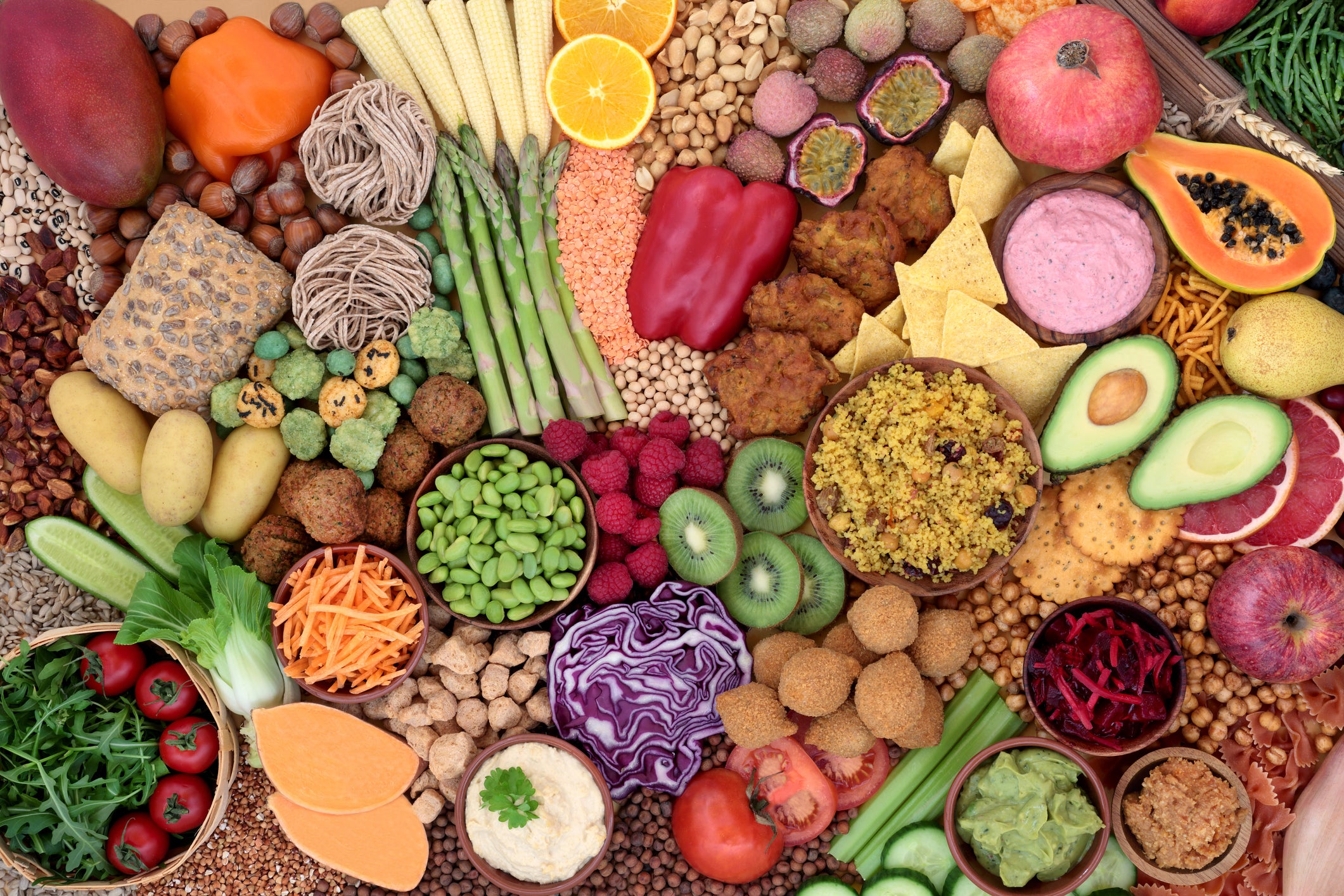Trending diets dip in and out of fashion on a regular basis; just look at the undulating popularity of the Atkins, keto, 5:2 or paleo over the years. However, by its original definition, diet is the opposite of temporary – it is the food you habitually eat. To support long-term health, you need to establish long-term healthy eating patterns, but with the amount of noise around nutrition nowadays, that is easier said than done.
To do it successfully, pays to swerve trends and instead focus on simply prioritising certain health-promoting foods. As a fitness writer, nearly all of the nutrition-minded academics, researchers, authors, dietitians, nutritionists and trainers I regularly speak to tend to agree on a selection of items you should be eating to live better for longer.
The message is clear: eat plenty of vegetables, fruits, legumes, nuts and whole grains,” writes Adrián Carballo Casla of the Aging Research Center at the Karolinska Institutet in Sweden. “Choose healthy fats like rapeseed oil and fish. Limit red and processed meats, sugary drinks and solid fats.” These findings come from a recent study published in the Nature journal. The foods listed above, Carballo Casla continues, are the foundations of diets associated with “slower ageing, better brain health and fewer chronic diseases”.
“Ageing is inevitable, but people can shape how it unfolds,” he concludes. “Our findings suggest that even small changes in diet can make a meaningful difference in how people experience later life, regardless of their age.”
The common denominators of a healthy diet
- Appropriate calorie consumption
- Prioritise nutritious wholefoods
- A wide variety of fruits and vegetables
- Avoid excessive consumption of processed meats
- Sufficient protein intake through lean sources
- Plenty of plant-based fibre sources – aim for 30g or more of fibre per day
- Whole grains
- Avoid excessive consumption of refined grains
- Nuts
- Seeds
- Beans
- Legumes
- Limited alcohol intake
Read more: How fibremaxxing became the secret to better gut-health and easy recipes to use now

What the research says
The Aging Research Center’s study followed more than 2,400 Swedish adults aged 60 and above for 15 years. Participants followed one of four existing dietary patterns:
|
MIND |
‘The MIND is an a priori-defined score based on the foods and nutrients shown to be protective for dementia. Many of its dietary components are those of the Mediterranean and DASH diets, including emphasis on minimally processed plant-based foods and limited consumption of animal and high-saturated-fat foods.’ |
|
AHEI |
‘The AHEI is based on a comprehensive review of the relevant literature and discussions with nutrition researchers to identify foods and nutrients that have been consistently associated with lower risk of chronic disease in clinical and epidemiological investigations.’ |
|
AMED |
‘The AMED is based on the Mediterranean Diet Score, which reflects adherence to the traditional Mediterranean diet. It incorporates several modifications based on dietary patterns and eating behaviours that have been associated with lower risk of chronic disease in clinical and epidemiological studies.’ |
|
EDII |
‘The EDII assesses diet quality based on its inflammatory potential. It is a weighted sum of anti-inflammatory and pro-inflammatory food groups and has been found to predict concentrations of plasma inflammatory markers. Unlike the other three dietary patterns, higher adherence to EDII indicates a less healthy diet.’ |
The first three “healthy” dietary patterns “showed a protective association with the speed of accumulation of chronic diseases [such as heart disease, diabetes and depression] in older adults over time”. The EDII diet, on the other hand, had a negative impact in this area.
“The study findings highlight the potential role of diet in the prevention of multimorbidity expansion in older populations, with possible implications for dietary guidelines, other public health strategies and clinical practice,” the paper concludes.
Or, as Carballo Casla puts it: “We found that people who consistently ate a healthy diet developed chronic diseases more slowly, in contrast to those whose diets were considered more inflammatory; that is, diets high in processed meats, refined grains and sugary drinks, which are known to promote low-grade chronic inflammation in the body.”

What we’re getting wrong about inflammation
Inflammation is a word that crops up a lot nowadays, with many food adverts crowing about their product’s anti-inflammatory capabilities. What is less publicised is what this actually means.
“Inflammation is actually not a bad thing,” says Dr Valter Longo, director of the University of Southern California Longevity Institute. “It is part of the human body’s response to attack – to attack bacteria or cancer cells, or to try to clear up junk that’s accumulated somewhere in the body.
“There is a whole set of cells and cytokines to get that done. Let’s say there’s a wound; you would have an inflammatory response because your system wants to fight infectious agents and repair the wound.”
Yet, the Karolinska Institutet’s study finds that “a diet high in inflammatory foods was linked to faster accumulation [of chronic diseases]”.
“The problem [with inflammation] is, as you get older, the process can get disrupted and it can continue when it shouldn’t continue,” Dr Longo explains.
Wrongly believing there is an infection of invasion, the cells of the immune system and cytokines continue in attack mode, damaging healthy tissues including those in the heart, brain and joints. This is how inflammation can contribute to a range of chronic diseases such as autoimmune disease and rheumatoid arthritis, says Dr Longo.
“The inflammation is at its best a healing process, but at its worst the consequences of inflammation can ramify through the body,” adds Professor David Nutt, a leading neuropsychopharmacologist specialising in drugs that affect the brain, and co-founder of alcohol alternative Sentia. “There are many disorders, which we call autoimmune disorders, where the body’s own immune inflammatory response attacks the body.
“When you get a cold, it drags you down a bit, and when people had Covid, a lot of them had severe depression and anxiety – that’s through inflammation. Alcohol produces the same kind of inflammation in the brain.”
For this reason, limiting or completely removing alcohol from your diet is another piece of advice I have consistently encountered for improved health and longevity.
Read more: The five ultra-processed food ingredients to avoid on packaging – and what to buy instead
.jpeg)
The common denominators of a healthy diet
Dr Longo’s “longevity diet”, which he recommends for better health and a longer life, shares many of its roots with the Karolinska Institutet’s recent conclusions.
“It almost completely eliminates red meat, it keeps white meat very low, and fish is eaten maybe three or four times a week,” he explains. “There are lots of vegetables, lots of legumes, lots of tree nuts, wholegrain cereals and some fruits. These are some of the ingredients that, consistently all over the world, have been associated with living a longer, healthier life.”
What does earn a prominent spot on this list is wholefoods – food that has been processed or refined as little as possible. These foods tend to be more nutritious than their processed counterparts, carrying benefits beyond their calorie count courtesy of their vitamin and mineral provisions.
“I like focusing on nutritious foods you can add into your diet because appetite is finite, so they tend to have a habit of displacing other [less nutritious] foods out of your diet,” says Ben Carpenter, an experienced trainer and author of best-selling books Everything Fat Loss and Fat Loss Habits.
He cites a study on children which found that, when they were encouraged to eat more fruit, they lost weight despite being told to eat more because it led to them eating fewer calorie-dense options such as chocolate and crisps.
“Often nutritious foods tend to be slightly less processed – for example, fruits and vegetables, lean proteins, beans, lentils and whole grains,” Carpenter continues. “Even if you’re eating things like rice and oats as opposed to more processed versions of the equivalent grains – doughnuts, pancakes and waffles – it’s a good move.
“I also like the idea of focusing on [encouraging people to eat more] lean sources of protein because that can have a weight management effect, an appetite regulation effect, and it can be good for fat loss and building muscle tissue, specifically if people are resistance training.”
Read more: Six gut-friendly recipes to boost your microbiome

Limit ultra-processed foods
Ultra-processed foods, like those referenced by Carpenter above, are a hot topic right now. Avoiding them is almost impossible, and limiting them is a hard task.
Experts I’ve spoken to have, at best, suggested they could be OK in moderation, and at worst warned people off them wherever possible.
Professor Chris van Tulleken is one of the leading voices in this space, having written the best-selling book Ultra-Processed People.
He defines ultra-processed foods as anything with an ingredient “you don’t typically find in a kitchen, like an emulsifier or a flavouring”. These items, van Tulleken says, are likely to be hyperpalatable and come with a decent serving of saturated fat, sugar, salt and calories alongside other unwanted ingredients. Through these inclusions, he argues, they can have addictive properties with the power to derail a healthy diet.
“If you can find a way of eating real food, we’re very sure that’s better for you,” he concludes. “You don’t have to believe any of the evidence around ultra-processed food to say that’s true – that’s established in nutrition.”
Read more: Three healthy recipes from Em the Nutritionist to reset your September

Plant power and fibre
Another theme among expert nutrition advice is the inclusion of plenty of plant-based wholefoods in your diet – particularly those rich in fibre. This can have a positive impact in many areas such as weight management and gut health.
One frequently recommended route to a healthier gut is to consume 30 or more different plant-based foods each week, says Holland and Barrett’s Emily Foster, a certified nutritionist with a master’s degree in applied sport and exercise nutrition.
“Within our gut microbiome, we have trillions of different microorganisms – you can think of them like a bustling, microscopic city,” she says. “There are beneficial bacteria, but also some viruses and fungi in there as well. The aim is to keep that balance in the bacteria, and also diversity within the types of bacteria that we have in our gut.
“There was a really interesting study called the American Gut Project [later renamed the Microsetta Initiative], which highlighted that a more diverse diet can lead to a more diverse gut microbiome, and this is linked to a healthier gut microbiome. [To achieve this] we want to be consuming plenty of plant fibres to support our gut health.”
For maximum benefits, this should include a healthy dose of prebiotic and probiotic fibres.
A 2019 review in The Lancet found that people who met the recommended daily fibre intake had significantly lower risks of dying from, or developing, chronic diseases including coronary heart disease, strokes, type 2 diabetes, colorectal cancer, and other cancer-related illnesses, Foster adds.
Another plant compound worth considering in your diet is polyphenols, according to Dr Karan Rajan, a medical doctor and author of This Book May Save Your Life. “They act as antioxidants with anti-inflammatory properties,” he says, adding that they are also often high in fibre.
A 2025 review published in the Ageing Research Reviews journal suggested that “polyphenols may exert geroprotective effects by modulating the hallmarks of ageing”. In layman’s terms, these compounds could boost longevity, having been associated with a lower risk of age-related diseases.
These are the main ones to look out for:
|
Type |
Examples |
|
Flavonoids |
For example, catechins in tea, anthocyanins in berries, quercetin in onions and isoflavones in soya. |
|
Phenolic acids |
For example, caffeic acid in coffee, ferulic acid in whole grains, and gallic acid in tea, grapes and berries. |
|
Proanthocyadins |
Found in fruits like grapes and apples, as well as cocoa and dark chocolate. |
|
Lignans |
Found in wholefoods such as flaxseeds and sesame seeds. |
|
Stilbenes |
The most well-known polyphenol in this category is resveratrol in red grapes and wine. |
|
Special cases |
Some polyphenols don’t fall into the main categories, such as curcumin, a unique curcuminoid found only in turmeric. |
Polyphenols can contribute to improved cardiometabolic function, possible lipid modulation and improved gut health, as well as having anti-inflammatory effects, says Dr Rajan. However, he adds, “We can’t isolate polyphenols as the sole driver of longevity from existing evidence. Other factors such as genetics, sleep, activity, lower smoking and processed food intake all play big roles.”
This is true across the board. There are many variables at play to determine how long you live and how well you live in that time – from exercise and diet right through to socioeconomic status and even luck.
But, as the Karolinska Institutet study states, diet and nutrition are at the forefront of factors known to influence your risk of chronic conditions. Prioritising these common denominators of a healthy diet can, therefore, be seen as a solid start for securing a longer, healthier life.

